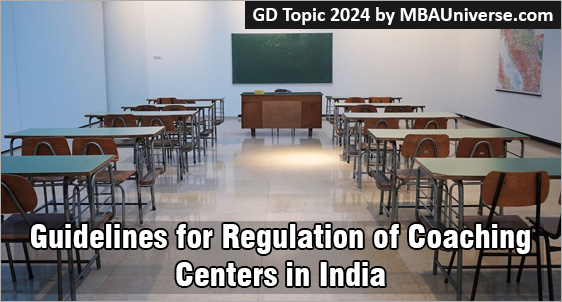
Government Introduces Comprehensive Guidelines for the Regulation of Coaching Centers in India – Pros and Cons
For MBA admissions, the latest GD topic GUIDELINES FOR REGULATION OF COACHING CENTER emerges as a critical subject for discussion. It directs attention towards the pressing issues surrounding private coaching centers, such as exorbitant fees, student stress, and the lack of standardized methodologies. MBA Aspirants must prepare GD topic GUIDELINES FOR REGULATION OF COACHING CENTER for upcoming MBA Admissions. The topic not only tests candidates' awareness of the educational landscape but also their ability to critically analyze and articulate nuanced viewpoints, crucial skills for success in the MBA admissions process. Read this MBAUniverse.com article on GD topic GUIDELINES FOR REGULATION OF COACHING CENTER.
Also Read
Introduction & Background
In response to a growing number of concerns surrounding private coaching centers, the Department of Higher Education, Ministry of Education, Government of India, has issued detailed guidelines for the regulation of these establishments. The issues include instances of exorbitant fees, undue stress leading to student suicides, and safety lapses resulting in accidents. The lack of a formal policy or regulation for these centers has prompted the government to take action, particularly in light of the rising student suicides and reported malpractices.
The guidelines acknowledge that the responsibility for regulating +2 level education lies with the State/UT Governments. The need for regulation gained further attention through debates, discussions, and parliamentary inquiries, leading to a Public Interest Litigation (PIL) in the Supreme Court. The PIL was eventually disposed of with the direction that the matter is essentially a policy issue to be addressed by the concerned authorities.
The Ashok Mishra Committee Report and subsequent correspondence from the Department of Higher Education to States/UTs highlighted the importance of regulation and a strict penalty system for coaching centers. The National Education Policy 2020 (NEP 2020) further emphasized the need to shift from a 'coaching culture' to a focus on regular formative assessment for learning. The NEP called for reforms in the existing system of Board and entrance examinations to reduce the reliance on coaching classes.
The guidelines propose a title, "Guidelines for Registration and Regulation of Coaching Center 2024," and outline objectives, including providing a framework for registration, suggesting minimum standard requirements, safeguarding student interests, and promoting holistic development through co-curricular activities.
Key points: GUIDELINES FOR REGULATION OF COACHING CENTER
Key points in the guidelines include the requirement for coaching centers to register with the competent authority, adhere to conditions for registration, maintain specific infrastructure standards, follow a prescribed curriculum, and appoint counselors and psychologists to support students' mental well-being. The guidelines also stress inclusivity and accessibility, prohibiting discrimination on various grounds and encouraging representation from vulnerable communities.
Registration and renewal processes, fees, and penalties for violations are outlined, and a focus on transparency, accountability, and the prevention of misleading advertising is evident throughout the document. The guidelines also emphasize the importance of a counseling system, awareness programs, and training for tutors to address mental health issues among students.
The guidelines address the concerns raised in various states, as seen in the Bihar Coaching Institute (Control & Regulation) Act, 2010, the Goa Coaching Classes (Regulation) Act, 2001, the Uttar Pradesh Regulation of Coaching Act, 2002, and others. However, recognizing the need for a unified approach, the central government proposes a model set of guidelines that States/UTs can adopt through appropriate legal frameworks.
Pros and Cons of the Proposed Regulation on Coaching Centers
Pros:
Cons:
Official Notification Issued on Government of India Ministry of Education Department of Higher Education on January 16, 2024
I am directed to state that the number of unregulated private coaching centers in the country continues to grow in the absence of any laid down policy or regulation.
In conclusion, the comprehensive guidelines aim to regulate and standardize the functioning of coaching centers across the country, prioritizing the well-being and development of students while addressing the existing challenges in the coaching culture. These guidelines represent a significant step towards creating a structured and accountable system for coaching centers, aligning with the broader objectives of the National Education Policy 2020. By reading above MBAUniverse.com article on GD topic GUIDELINES FOR REGULATION OF COACHING CENTER, you will be clear on this topic. All the best!
Also Check Latest Group Discussion GD Topics
Exam 2024 Notification